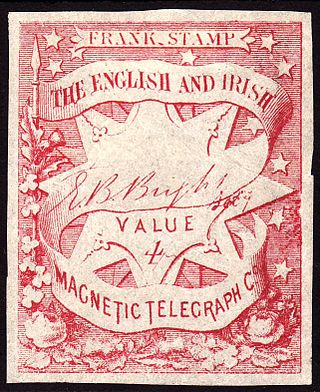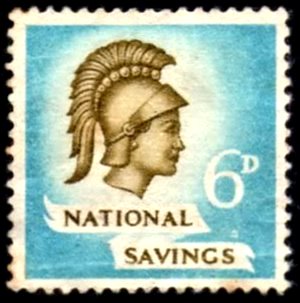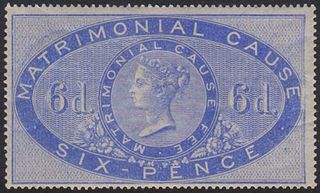Related Research Articles
A stamp act is any legislation that requires a tax to be paid on the transfer of certain documents. Those who pay the tax receive an official stamp on their documents, making them legal documents. A variety of products have been covered by stamp acts including playing cards, dice, patent medicines, cheques, mortgages, contracts, marriage licenses and newspapers. The items may have to be physically stamped at approved government offices following payment of the duty, although methods involving annual payment of a fixed sum or purchase of adhesive stamps are more practical and common.

A revenue stamp, tax stamp, duty stamp or fiscal stamp is a (usually) adhesive label used to designate collected taxes or fees on documents, tobacco, alcoholic drinks, drugs and medicines, playing cards, hunting licenses, firearm registration, and many other things. Typically, businesses purchase the stamps from the government, and attach them to taxed items as part of putting the items on sale, or in the case of documents, as part of filling out the form.

Stamp duty in the United Kingdom is a form of tax charged on legal instruments, and historically required a physical stamp to be attached to or impressed upon the document in question. The more modern versions of the tax no longer require a physical stamp.

An excise, or excise tax, is any duty on manufactured goods that is normally levied at the moment of manufacture for internal consumption rather than at sale. It is therefore a fee that must be paid in order to consume certain products. Excises are often associated with customs duties, which are levied on pre-existing goods when they cross a designated border in a specific direction; customs are levied on goods that become taxable items at the border, while excise is levied on goods that came into existence inland.

The British Library Philatelic Collections is the national philatelic collection of the United Kingdom with over 8 million items from around the world. It was established in 1891 as part of the British Museum Library, later to become the British Library, with the collection of Thomas Tapling. In addition to bequests and continuing donations, the library received consistent deposits by the Crown Agency and has become a primary research collection for British Empire and international history. The collections contain a wide range of artefacts in addition to postage stamps, from newspaper stamps to a press used to print the first British postage stamps.
The Board of Inland Revenue Stamping Department Archive in the British Library contains artefacts from 1710 onwards, and has come into existence through amendments in United Kingdom legislation.
The Davies Collection is a collection of Libyan revenue stamps from 1955 to 1969, formed from material from the Bradbury Wilkinson Archive, and presented to the British Library Philatelic Collections by John Neville Davies in 1992.

The Contributions Agency Collection is a collection of British National Insurance stamps that forms part of the British Library Philatelic Collections.

The Langmead Collection is a collection of British and Irish telegraph stamps and stationery from 1851 to 1881 that forms part of the British Library Philatelic Collections. It was formed by Peter Langmead and received by the Library under the "in lieu of tax" scheme in 1991.

The Wilson-Todd collection is a collection of postage stamps issued during, or associated with, the First World War, including many war tax stamps, that forms part of the British Library Philatelic Collections. It was created by James Wilson-Todd and donated to the British Museum by his mother Lady Wilson-Todd after his death. As of April 2008 it was held in one box.
The H.M. Customs and Excise Collection is a collection of British revenue stamps in proof or registration form for Table Water Duty, Medicine Tax, Playing Card Tax and other duties. It forms part of the British Library Philatelic Collections and was transferred to the Library by H.M. Customs & Excise in 2002.

The H.M. Stationery Office Collection is a collection of British excise revenue material including National Savings and National Insurance stamps that forms part of the British Library Philatelic Collections. It was received from H.M.S.O. between 1982 and 1992.
The Turner Collection of Forgeries is a collection of forgeries of postage stamps of the world to about 1900 that forms part of the British Library Philatelic Collections. It was formed by S.R. Turner and donated in 1973. It is held in five numbered boxes and contains a few genuine stamps for comparison.

The Turner Collection of Railway Letter Stamps is a collection of railway letter stamps of the United Kingdom from 1891 to the mid-1940s that forms part of the British Library Philatelic Collections. It was formed by S.R. Turner and donated in 1973.
The Ryan Collection is a collection of municipal revenue stamps of Budapest from 1898 to 1947 formed by Gary Ryan. It forms part of the British Library Philatelic Collections and was donated to the Library in 2001.
The Booth Papers are a collection of philatelic research documents of Roger Booth FRPSL used for the preparation of his catalogues of British and Irish revenue stamps. The papers form part of the British Library Philatelic Department Collections and were donated to the Library in 2004.

The Ewen Collection is a collection of railway letter stamps of the United Kingdom from 1891 to 1912 that forms part of the British Library Philatelic Collections. It was formed by Herbert L'Estrange Ewen and donated in 1949 by his sister Mrs Clement Williams.

Revenue stamps of the United Kingdom refer to the various revenue or fiscal stamps, whether adhesive, directly embossed or otherwise, which were issued by and used in the Kingdom of England, the Kingdom of Great Britain, the United Kingdom of Great Britain and Ireland and the United Kingdom of Great Britain and Northern Ireland, from the late 17th century to the present day.

Libya first issued revenue stamps when it was an Italian colony in 1913 and continues to do so to this day. The provinces of Cyrenaica, Tripolitania and Fezzan as well as the municipality of Tripoli also had separate revenue issues until the 1950s and 1960s.
Revenue stamps of Guernsey refer to the various revenue or fiscal stamps, whether adhesive or directly embossed, which were issued by the States of Guernsey for use on the island of Guernsey, a British Crown dependency. There were general-duty revenues, along with issues for Entertainments Tax, Sales Tax, Income Tax and Insurance.
References
- ↑ The Turner Collection. Archived 2012-06-18 at the Wayback Machine British Library, 19 February 2012.